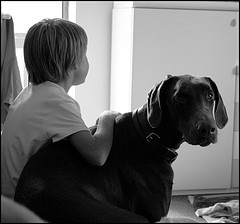 Now that radiation from the Japanese Fukushima Daiichi nuclear power plant has reached the United States and officials assure us that “does not pose a public safety risk to people outside of the disaster area”, I still it is prudent to protect your family by ensuring they are getting an adequate supply of iodine in their diet. Iodine protects our thyroid from many sources of radiation, such as cell phones and x-rays. Besides, it is important for overall health.
Now that radiation from the Japanese Fukushima Daiichi nuclear power plant has reached the United States and officials assure us that “does not pose a public safety risk to people outside of the disaster area”, I still it is prudent to protect your family by ensuring they are getting an adequate supply of iodine in their diet. Iodine protects our thyroid from many sources of radiation, such as cell phones and x-rays. Besides, it is important for overall health.
The Huffington Post reported in December of last year, before we were even concerned about nuclear radiation from Japan:
So, there can be no liability in everyone guarding against extra radiation exposure. Radiation does cause cancer. How much radiation a person can handle without developing cancer is very individual…
You can help protect yourself and your loved ones by ensuring that you have enough iodine in your diet. Iodized table salt is not ideal. Table salt is from underground mines and is processed to remove all trace elements so that only sodium chloride is left. Sea salt contains 80 trace elements, in addition to the mineral sodium chloride. It is always better to use a nutrient that is not isolated, as you never find high doses of single nutrients occurring in nature.
The best sources of iodine may be protein bound. Look for kelp or seaweed supplements. It’s best to start iodine supplementation slowly and build up to a higher dose.
As families are stocking up on seaweed, pets may be forgotten. Our dogs and cats have thyroids. In fact, one of my female dogs, who has since passed away at 14 years of age, had a thyroid condition. During these times of excess radiation, whether from nuclear fallout or cell phones, pets need iodine too.
The easiest way to give you pets that extra iodine is to sprinkle [amazon_link id=”B001A1VI8Q” target=”_blank” container=”” container_class=”” ]powdered kelp[/amazon_link] on their food. They love it, and it is really easy to do. In fact, Dr. Pitcairn recommends it as a daily supplement for pets in his great book [amazon_link id=”157954973X” target=”_blank” container=”” container_class=”” ]Natural Health for Dogs & Cats[/amazon_link].
Kelp is also high in iron, potassium, and calcium. Nutrition for Healthy Living reports:
The naturally high iodine content of Kelp helps it act as an antibiotic in your body as well. When there is an infection in your body, Kelp will help assist the thyroid to release more iodine into your blood stream and iodine kills infections.
I don’t actually measure the kelp I put on my dogs’ food; I just sprinkle some on. Dr. Pitcairn has recommended doses based on the weight of your pet, and if you would like that info, post a comment here and I provide the answer.
It’s good to stock up on kelp now, as who knows what level of radiation Pacific kelp will contain in the coming weeks. Best to get the stuff that has already been harvested.
Photo: ![]() Some rights reserved by coda.allegra
Some rights reserved by coda.allegra
Would love to know dosage for cats to take kelp powder. Live on the west coast of the US. Taking seaweed myself & other remedies, but want to include kelp for the cat.
Dr. Pitcairn’s recipe for cat powder mix is:
1/2 cup nutritional yeast
1/4 cup bone meal
1/4 cup kelp meal
One teaspoon a day of this mix
Thank you Jennifer!